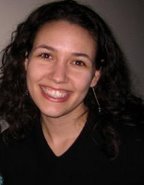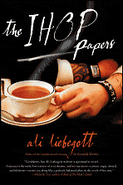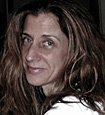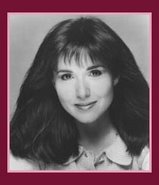
I wish each and every one of you a very wonderful, healthy, prosperous and cheerful 2008.
My interviews with literary personalities on their writings, latest projects, novels and current events.



Paris |
London |
New York |
Los Angeles |

In lieu of a personal photo, Ms. Barney has supplied a company logo.
Stacey Barney, an editor at Putnam Books for Young Readers has held posts in both adult and children's book publishing, beginning her career at Lee & Low Books, a multicultural children's book publisher. She then worked at Farrar, Straus and Giroux with such talented new writers as Chris Abani and Lisa Dierbeck.
At Amistad/HarperCollins, she published LA Times bestselling author Tamara T. Gregory's Passport Diaries as well as the acclaimed memoir, This Voice in My Heart. Before coming onboard Putnam's team, she worked at Dafina/Kensington, where she launched a Young Adult list with such titles as DRAMA HIGH, SO NOT THE DRAMA, BOY SHOPPING, and PERRY SKKY JR, the spin-off to bestseller Christian teen series PAYTON SKKY.
At Putnam, Stacey is looking for multicultural voices in everything from chapter books and middle grade to Young Adult.
EI: How often do you accept an offering because you feel it could be edited into publishable form but then fail to do so—either because of difficulty with the author or it wasn't any good in the first place?
Stacey Barney: I’ve not had this experience. I’ve never taken something on and then failed to publish it. When I take on work it’s because the author has done their job and what I receive on submission is already very polished.
When I take on something less than polished, it’s because I see the potential in it, and have a vision for it that matches the author’s vision. When Penguin/G.P. Putnam's Sons considers a new author's manuscript, does film potential play a role in the decision process? Can you rank the top genre markets in terms of most lucrative to least? Film potential doesn’t play a role in whether we decide to publish something or not.
While I won’t provide a ranking, I will say that Fantasy tends to be a very lucrative side of the business as does commercial teen fiction—books that are issue driven or chick lit type narratives such as the Gossip Girls series.

EI: Will you explain to us how you make contact with an editor at a major house once you have a manuscript you are excited about? Can you tell the readers so that they can understand the role of an agent? Do you send an editor a formal proposal of some type? Or do you just pick up the phone? Does it vary from house to house, press to press?
Holly Root: When I have a project that’s ready to go out the door—edited, primped, and polished—I start by pulling together a submission list of editors to talk to about the book. The next step is crafting a pitch letter. This will later be the cover letter for the submission, but it’s also where I begin to refine the pitch. The best pitches, like the best queries, pique the reader’s interest, play up the project’s selling points, and help build excitement about the project.Once that submission list is final and the letter is set, I’ll get in touch with the editors and personally pitch them the book, then send over the manuscript or proposal with that cover letter. The exact kind of pitch does vary; some people prefer to have the details about projects over email, others by phone. My pitch gets the book in the door, but ultimately it is the work that sells. My role as the agent is to get that work into the right person’s hands and highlight the potential for that book’s success.

.EI: Do you see the demand for first novels increasing? Any difference between literary and genre work? What is your opinion?
Byrd Leavell: I think the case could be made that the fact that a constant demand for first novels exists is one of the most redeeming aspects of this business. Whether it is increasing I wouldn't venture to speak to, but what I can tell you is that that book publishing is full of terrific editors that read the novels we send to them and do so quickly. And if they like and believe in them they do everything they can to push them through the nearly Sisyphean process that putting together an offer from a publishing house can be.
A first novel is rarely ever an easy submission, but at the same time there is a continual, almost desperate hunger for talent within book publishing. And it this hunger that gives every writer out there a reason to keep sitting down in front of their computer. If you are one of the blessed few that is able to rise above the rest, find your voice (whether it is literary fiction or a zombie novel) and write a manuscript that captures a reader the way only good fiction can, then believe me when I say that you will have no trouble finding an agent

EI: Is it true that the first 3 chapters in a MS is crucial, but if the narrative is awkward or the prose poor, won't that be obvious right away? Why would an editor or agent need to read past the first 3 chapters?
Nathan Bransford: The first three chapters are definitely important because they have to hook an agent right away. I am always looking for a great plot and a writer who has mastered the craft of writing. I don’t often read manuscripts where the narrative is awkward and the prose is poor, because writers who don’t have a mastery of narrative and prose don’t make it past the query stage.

Robert G. Diforio has been in the publishing industry for 40 years, including 17 years at New American Library Dutton\Penguin USA from VP Sales to President and Publisher, Chairman and CEO. He’s the founder and sole owner of D4EO Literary Agency since 1989.
E.I. What qualities must a manuscript possess in order for you to really push to see it published? Do you base it on the query letter?
Robert Diforio: It is the query letter that gets – or doesn’t – my attention in the first place, but it clearly is the ms. or proposal that determines my decision to represent the work or not.
If it is a novel, it is the author’s voice in the ms. that will generate my attention, or not. If the voice is strong and the story compelling, I am apt to say yes. Once I say yes, I do my utmost to find editors who agree with me and strike the best deal, with the right editor, that I can on behalf of the author. If the work is non-fiction, then it is a combination of the work itself – it has to be compelling – and the author’s ability to help sell his work. Publishers demand that authors, especially first time authors, have a media platform before they will consider publication. In its absence, the proposal or manuscript would have to truly capture my attention for me to take the time to try to find editors who agree.
In both fiction and non-fiction, the work has to excite me. If it doesn’t, I am not the agent to sell it.

In lieu of a personal photo, Ms. Capron has supplied a client's book cover.E.I. Thank you for dropping by and giving me the opportunity to get to know you better. Ms. Capron, Let’s say a writer compose a query that is brilliant and exhibits adequate credentials plus a unique and provocative story idea, and the writing sample she includes will persuade just about any agent in the literary business. Do you think that she will hear quickly from those who are interested? Will an agent give the writer a go signal to send the whole manuscript right away? What’s your opinion?
Elise Capron: The situation is different for every agent. If the project is fiction, one must remember that fiction is all about personal taste. What speaks to one person may not speak to another. Response time from agencies also varies greatly.
At the Dijkstra Agency we have a reading response time of 6-8 weeks (or sooner if possible), and when we’re excited about a project we will try to get in touch with the author sooner rather than later. Agencies all have different policies on when to request a full manuscript.
At the Dijkstra Agency, if we read something we really like, we’ll typically get a second read on the partial manscript, and then—if we get support from our colleage—we’ll request the full manuscript. We only request full manuscripts when we are seriously interested.
If an author hasn’t heard back from an agency after a certain period of time, don’t take that as a sign of rejection. Call the agency and check on the project’s progress (please allow at least a few weeks to pass before calling, however) to make sure they received it.
E. I. So great for you to do the interview. Thank you so much.
Elise Capron: I thank you very much.

Along with Michael Carlisle, and Richard Pine, Kim Witherspoon is the founding partner of Inkwell Management. Ms. Witherspoon graduated from Brown University in 1984 with a BA in International Relations. Then at the tender age of 26, and with the collaboration of her partners, she launched what has become one of the most successful agencies in New York's Manhattan. Her clients are frequently published internationally, as well.
For the past 15 years, Ms. Witherspoon has represented best selling and critically acclaimed authors of both fiction and nonfiction genres. Her client list includes: Kate Atkinson, Anthony Bourdain, Susan Cheever, Jim Crace, Cindy Crawford, Eloisa James, Neil Jordan, Sophie Kinsella, Richard Marcinko, Edna O’Brien, Arundhati Roy, Lionel Shriver, Lalita Tademy, and Rebecca Wells.
She is also a founding board member of a new public charter high school, The Bronx Academy of Letters. She remains a member of the Authors Guild, and is the editor of two anthologies, including: DON’T TRY THIS AT HOME: Culinary Catastrophes From the World’s Greatest Chefs. (www.inkwellmanagement.com/
E.I. Ms. Witherspoon, thank you for stopping by. Would you please explain as the founding partner at Inkwell Management, how do you view the market for first novels in the literary mainstream genre and literary fiction? Does the culture at your agency differ from other agencies with respect to giving a serious look at first-time authors?
Kimberly Witherspoon: "At InkWell, first novelists with strong manuscripts enjoy an opportunity that previously published authors do not. An unpublished author has no sales track, so provided that his or her book is exceptionally strong, we are free to work with the publisher to project how many copies the book might potentially sell, unfettered by any past sales history. Similarly, if an author has an interesting personal story, we are able to present a fresh profile to the media. The field is wide open -- and that's a uniquely powerful moment in a writer's life, provided that we're presenting a compelling read.
We’re always excited about reading an especially talented first-time author -- whether their work is literary or commercial -- as helping launch a writer’s career and then building their audience is deeply satisfying. Essentially, InkWell is committed to helping writers gain the recognition they deserve at any stage of their career -- whether we're presenting their first book or their 10th!"

Lisa Bankoff has been with ICM for more than twenty five years. Her background in publicity, marketing, promotion and editorial gives her a unique insight, and a solid foundation for the agency business. Actually her first dream was to be a journalist. Instead she chose a career path that would bring her closer to her love of writing working in both with fiction and nonfiction.
Ms. Bankoff worked with the late Jed Mattes. He was a highly regarded literary agent, who is remembered for nurturing the careers of well-known gay writers such as Armistead Maupin, Michelangelo Signorile, and Urvashi Vaid. Mr. Mattes also represented the best-selling author Dr. Seuss (Theodore Geisel), and playwright Michael Frayn.
Many of Lisa Bankoff’s clients have written best-selling books. Of those many are clients she nurtured from day one of their writing careers. Loyalty and commitment along with her passion for the business are the keys to her success as an agent. Her client list reads something like a who’s who: Elizabeth Berg, Doug Brinkley, Claire Cook, John Colapinto, Chris Hedges, Laura Kasischke, J. Robert Lennon, David Lipsky, Ann Patchett, Mike Perry, Anne Roiphe, and Anne Ursu.
E. I. What combination of literary factors make an author successful in terms of book sales? Is it setting, dramatic premise, or great wordsmithing?
Lisa Bankoff: Brilliant writing. Compelling characters. A unique dramatic premise. A perceptive, gung-ho editor. Marketing muscle. Enthusiastic blurbs. Irresistible book jacket. A media-savvy author. Plentiful review attention. Much hard work and collective effort has gone into the details attending publication.
Why isn't the book selling? Luck is a four letter word. There's good luck, the sort that takes your breath away, rare and thrilling; the phone call (Oprah!); or the award (Barnes & Noble Discover winner!); or the film deal (Uma!). I've experienced all of those and then there's the other side of luck, the bad-timing, can't catch-a-break, is-anyone-out-there, does-anyone-still-even-read-variety. It's important to bear in mind that the publishing gods can be fickle and then just ignore them, do your very best and don't stop.

"The Jennifer DeChiara Literary Agency is a New York City-based full-service literary agency, recently named one of the top 25 literary agencies in the country by Writers Digest.
The agency specializes in children's literature of all ages -- picture books, middle-grade, and young adult -- but also represents high-quality adult fiction and non-fiction in traditional and non-traditional arenas. The categories that we are most enthusiastic about agenting are: literary and commercial fiction; mysteries; thrillers; celebrity biographies; humor; psychology and self-help; parenting; health and fitness; women's issues; men's issues; pop culture; film and television; social issues and contemporary affairs.
We work with major publishers such as HarperCollins, Simon & Schuster, Carroll & Graf, etc., as well as audio, web, and electronic publishers where appropriate. The agency has affiliations with subagents throughout the world, including individual countries in Europe, Eastern Europe, the Far East, and South and Central America. We also have strong working relationships with several Hollywood agencies. " (Article from JD Lit Agency Website: www.jdlit.com/)
E. I. : Thank you for dropping by and giving me the opportunity to get to know you better. Ms. DeChiara, You specialize in literary fiction and commercial fiction, but does that also include general fiction? How do you define literary?
Jennifer DeChiara: The agency represents all kinds of fiction, but we are most passionate about literary fiction, which I define as beautiful writing that is a pleasure to read.
A literary novel usually appeals to a more intellectual crowd; it either has a unique style or exquisite writing, or both. It's the kind of book where I find myself reading a sentence or a paragraph over and over because the language feels wonderful on my tongue; I will remember sentences that the writer has written many years later. I always say that you can flesh out a character in a book or rewrite a plot - you can restructure an entire novel, if you have to - but you can't give a writer that kind of talent, the kind of writing that will resonate forever in a reader's heart.
E. I. So great for you to do the interview. Thank you so much.
Jennifer DeChiara: I thank you very much.

She has been guiding authors through the publishing process since she co-founded BookEnds in 1999. As a literary agent, Jessica prides herself on working closely with her authors to make their goals come to fruition. Jessica represents mystery, suspense, thrillers, romance, erotica and nonfiction. More about Jessica and BookEnds can be found at www.bookends-inc.com or bookendslitagency.blogspot.com
E. I. Thank you for dropping by and giving me the opportunity to get to know you better. Ms. Faust, In your opinion, is it a mistake to believe that the opening chapter can be successful in a third-person omniscient narrative, without introducing the protagonist and without a single line of dialogue until the very end of the chapter?
Jessica Faust: Unfortunately there isn’t an easy, conclusive answer to this question. It honestly depends on the author, the book and the author’s ability to pull it off. I do not believe there are any concrete rules to making a book work. I think that if you can make it work then it will work. The problem is that there are certain things that few people have been able to do well which is why these rules come into play.
E. I. What makes a certain manuscript stand out from the pile and how many of those first-time authors has BookEnds gotten published over the past few years?
Jessica Faust: The hook is what grabs me or doesn’t grab me immediately. Before even reading any of the material I make part of my decision based on the query letter. If your hook sounds exciting and different I will start reading your material with excitement. However, if you don’t have a strong hook I might not even get to more than a few pages of the book. Of course, after the hook it’s all about the writing—a solid plot, great characters, etc.
Let me explain about the hook a little. I think many people have gotten the misconception that a hook is only for commercial fiction and has to be huge and dramatic, or very obvious like a cozy mystery series with knitting or a book with “Code” in the title. The truth is that a hook doesn’t have to be so obvious. It can be something small that makes your book stand out and catches the eye of the readers. Bella Andre does that Tempt Me, Taste Me, Touch Me, a collection of erotic stories set in Napa Valley. Napa Valley and the food andwine she includes make a hook. It makes her book more than just a collection of stories. Every book has a hook if you dig deep enough, it’s the writer’s job to really make that hook stand out for the reader.
E. I. So great for you to do the interview.
Thank you so much.
Jessica Faust: I thank you very much.

In lieu of a personal photo, Mr. Lazar has supplied a client's book cover.
E.I. What is the publishing climate now for first time literary authors as compared to when you started the business? In what ways does it differ from the current genre climate?
D. Lazar : The climate hasn't really changed. There's a lot of bemoaning about how hard fiction is -- all fiction -- but still, novels still break out in the bookstores, and agents are still making big sales to publishers eager to make big new careers. In general, genre fiction (which is not a judgment of a writer's quality, since it's a matter of fact that every genre has its stellar talents that should & do transcend any crass label) can be an easier sell, I suppose, because the package and channels are little more evident. A thriller is a more specific kind of novel than just a "novel." I think across the board the stakes are higher, in that the hits are hitting bigger, and the books that fail, because they're set up so spectacularly, fail bigger. Also, the bigger accounts (B&N especially) have a great deal of sway in a book's production, from the jacket to the title to the existence of the book in its stores at all! But by all accounts, publishing is a cyclical beast and what is failing today could be hot again tomorrow. Power to the readers.


No comments:
Post a Comment